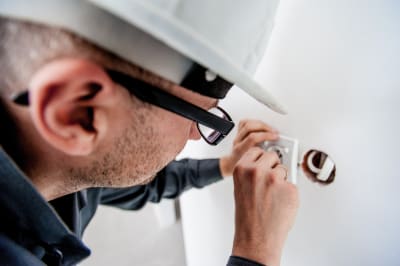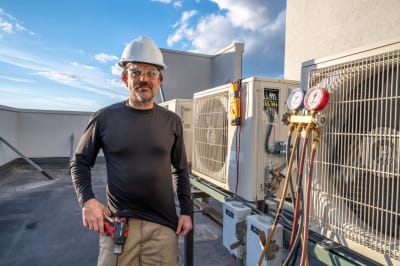Starting a successful career as an electrician in Vermont is quite straightforward. The most important part of the entire process is preparation.
People who get overwhelmed by the process have yet to take the time to familiarize themselves with the key steps beforehand.
To ensure readers of this page do not have these issues, we have examined the components and considerations necessary to become a successful electrician in Vermont.
We examine the basic prerequisites that candidates must meet before pursuing education. Then, we move on to the types of education available to prospective electricians and the pros and cons of each.
Furthermore, the article explores important licensure and certification considerations before finally focusing on the state’s salary and career outlook for this profession.
How to Become an Electrician in Vermont
The following are the considerations that candidates must make to start their electrician careers in Vermont on the right path.
Preparation
As mentioned earlier, preparation is the most important part of becoming a successful electrician in Vermont. Candidates must prepare for their education by having a high school diploma or GED and developing a strong foundational understanding of mathematics and other science subjects.
Education
For their education, aspiring electricians in Vermont usually have two main points of focus:
- Academic Training—Academic training should be the first focus for individuals to consider. The state requires aspiring electricians to have 576 hours of classroom instruction.
This can be attained through community colleges, trade schools, and other vocational institutions.
- On-the-Job Training – along with 576 hours of classroom training, candidates are also expected to develop real-world familiarity with their prospective duties. To do so, they must pick up nothing less than 8,000 hours of training on the job.
They may do this by attending apprenticeship programs, which also pay them some income while still learning.
Employment
Lastly, after completing the above steps, candidates may follow the licensure process below and then secure employment to become full-fledged electricians. Joining a professional organization also helps with career growth.
Explore trades with similar paths:
Licensure & Certification Requirements
In Vermont, anyone looking to work as an electrician professionally must be licensed by the Vermont Electrical Board, which belongs to the Department of Public Safety. The steps above, including having 8,000 hours of experience and 576 hours of classroom training, are basic requirements.
Afterward, candidates may officially send an application to the board and pass the journeyman licensing examination. The license costs $115 and must be renewed every 3 years through 15 hours of continuing education.
Journeyman license holders may apply for a Master’s license after working for at least two years in this capacity. A Master electrician license in Vermont costs $150, is valid for three years, and requires 15 hours of continuing education.
Top Electrician Schools in Vermont
Below are some high-quality schools and training programs for aspiring electricians in Vermont.
Vermont Technical College
Randolph Center, VT Campus Only
Vermont Technical College has Randolph Center, Williston, Lyndon, and more locations. Candidates can apply for an array of electrical technology programs that operate at a high educational standard at any of these places.
Tuition
FreeContact
(802) 728-1680
vtcelpl@vermontstate.edu
MEI Electrical Contractors
Westfield, VT Campus Only
MEI Electrical Contractors electrical apprenticeship training includes 8,000 hours of on-the-job training. It also includes possible benefits such as health insurance and dental insurance.
Tuition
FreeContact
(888) 988-9678
jobs@mei-vt.com
Stafford Technical Center
Rutland, VT Campus Only
Lastly, at Stafford Technical Center, candidates can enroll in a strong electrical technology training program with laboratory and classroom components.
Tuition
Call for DetailsContact
(802) 770-1056
chris.tooley@rcpsvt.org
Explore electrician schools in Vermont by city:
Salary & Career Outlook
A fresh electrician starting their career in Vermont will manage an annual average salary of at least $54,237. Incidentally, this is relevant for candidates among the lowest earners, and it can get even higher as they gain more experience.
For instance, the median earners manage an annual average salary of $76,807, while the highest-paid take home an annual average salary of $108,768. Experience, credentials, employers, and location also help candidates maximize their returns.
Putney, for instance, is the city with the highest pay for electricians in Vermont, with an average annual salary of $93,187. Brattleboro and Burlington follow, with annual average salaries of $79,537 and $78,475, respectively.
Concerning the job outlook, aspiring electricians in Vermont will be glad to know that the projections for this field are very positive. The Bureau of Labor Statistics predicts that thousands of job openings and more demand for electricians will be sustained over the next 10 years.





